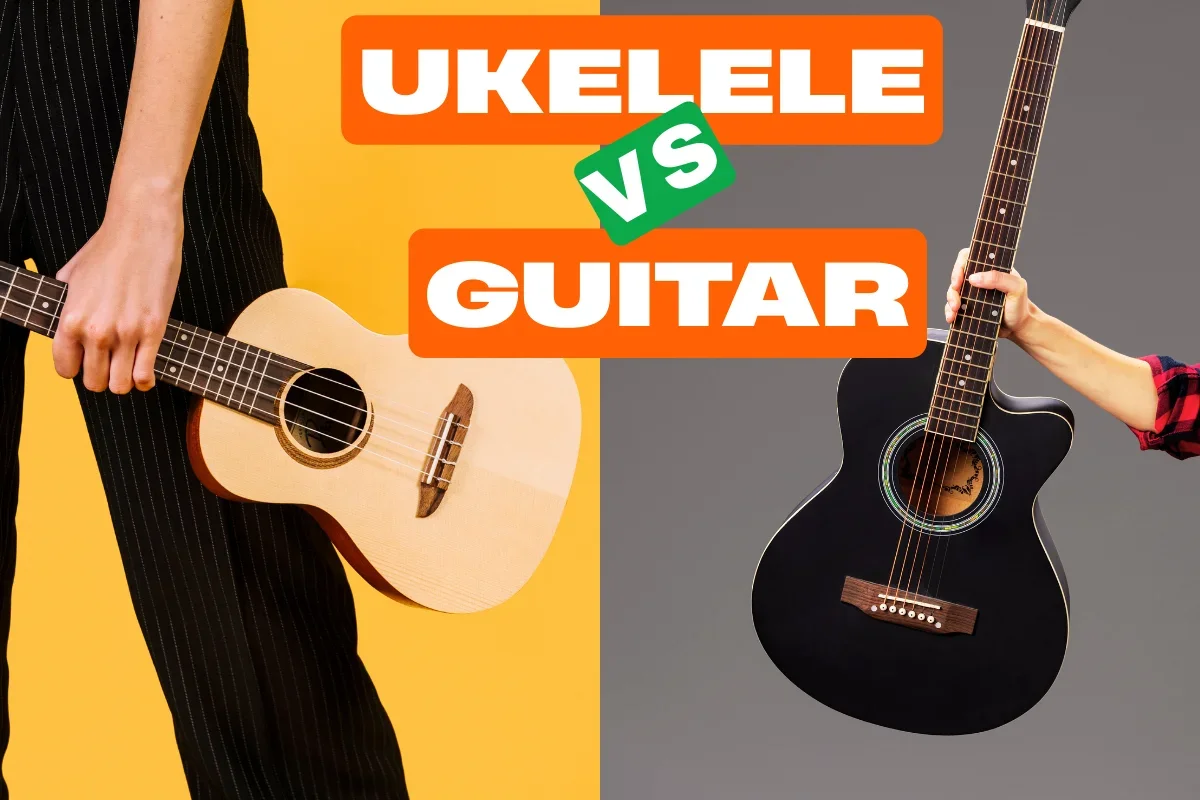Guitar vs Ukulele: Which Should You Learn First?
Both the guitar or ukulele are among the most loved musical instruments in the world. They look similar, but the experience of learning and playing each is quite different. Whether you want to play music casually or dive deep into your musical journey, understanding the key differences can help you make the right choice.
Key Differences Between Guitar and Ukulele
The guitar and ukulele may share a similar shape, but they differ greatly in size, tuning, and overall sound. A guitar has six strings, usually steel or nylon, while the ukulele has four nylon strings.
This simple difference changes everything from the way you form chord shapes to how the instrument feels under your fingers.The ukulele produces a bright, cheerful tone often heard in Hawaiian or pop music, while acoustic and electric guitars create deeper and richer sounds, perfect for blues, rock, and folk. The learning curve for ukulele players is often shorter since it’s lighter, smaller, and less demanding on finger strength. On the other hand, the guitar’s versatility and wide.
Benefits of Learning Guitar
Wide Musical Range
A guitar has six strings, giving it a broader musical range than the ukulele. You can play everything from blues to classical to metal.
Fits Multiple Musical Genres
The guitar works across many musical genres pop, rock, country, and jazz. Both acoustic and electric guitars adapt easily to different playing styles.
Builds Finger Strength and Coordination
The steel strings of a guitar help strengthen your fingers and improve hand coordination. This makes it easier to switch between complex chord shapes and scales later.
Great for Songwriting and Accompaniment
Many singers and guitar players use it as a foundation for playing songs or writing new ones. Its versatility makes it ideal for both solo performance and group settings.
Long-Term Growth Potential
The learning curve is steeper than the ukulele, but the reward is much greater. Once mastered, you’ll be comfortable with various musical instruments and genres.
Performance and Stage Value
A guitar looks and sounds impressive on stage, perfect for live gigs and open mics. You’ll connect easily with audiences through recognizable riffs and melodies.
Benefits of Learning Ukulele
Beginner-Friendly Instrument
The ukulele is smaller, lighter, and has four soft nylon strings, making it easier to play. It’s ideal for beginners who want to learn an instrument without stress.
Quick Learning Curve
You can start playing songs within days of practice. Its simple chord shapes and tuning make it easier to learn compared to the guitar.
Affordable and Portable
A good-quality ukulele costs much less than a beginner acoustic guitar. Its compact size makes it easy to carry, perfect for travel or casual jamming.
Gentle on Fingers
The nylon strings are softer than steel strings, making them more comfortable for beginners or kids.
Less finger pain means longer and more enjoyable practice sessions.
Great for All Ages
Whether you’re a child, teen, or adult, the ukulele suits all ages and skill levels. Many people find joy in learning the ukulele at any stage of life.
Perfect for Relaxed Musical Genres
The ukulele shines in Hawaiian, pop, and indie musical genres. It brings a cheerful, bright sound that’s easy to blend with vocals or other musical instruments.
Encourages Creativity and Joy
The simplicity of the ukulele lets you focus more on rhythm and creativity instead of complex theory. It’s a great way to start your musical journey with confidence.
Skill Levels: Which Instrument Is Easier for Beginners?
If you’re just starting your musical journey, the ukulele is generally the better choice. It’s easier to play, the strings are soft, and you can learn popular songs in a short time. Most players find the learning curve on ukulele less intimidating since there are fewer chords to remember and less tension on the strings.The guitar, while more challenging at first, rewards persistence.
Once you get past the initial hurdles like pressing steel strings and memorizing finger positions, you gain access to a much wider world of musical genres and styles. So if your goal is to eventually perform rock solos or accompany a singer, starting with the guitar might be worth the effort.
Ready to play like you’ve always dreamed? Book your guitar lesson at Zoom Twin Cities and make it happen.
Popular Music Genres for Guitar and Ukulele
The guitar is deeply rooted in nearly every musical genre imaginable. From blues legends and jazz improvisers to pop icons and metal shredders, every guitar player brings their unique sound to the stage.
Acoustic guitars fit perfectly in folk and country, while electric guitars dominate rock, punk, and metal.
The ukulele, on the other hand, adds a warm, tropical vibe to any track. It’s often heard in Hawaiian, pop, and indie music. In recent years, artists have blended both guitars and ukuleles in modern productions to create bright, layered tones that stand out.
No matter your style, both instruments allow you to play music that fits your personality and taste.
Cost Comparison: Guitar vs Ukulele
Budget often influences the decision between a guitar and a ukulele. Generally, ukuleles are more affordable, making them ideal for beginners or students.
You can get a high-quality beginner ukulele for a fraction of what a decent acoustic guitar costs. Guitars vary widely in price depending on brand, materials, and type. Electric guitars require amplifiers and cables, which adds to the expense.
However, if you’re committed to a serious musical journey, investing in a good guitar can pay off in the long run. Think of it as an instrument that grows with you, offering endless room for improvement and expression.
Personal Preferences: Choosing Based on Your Musical Goals
Your choice between ukulele vs guitar comes down to your goals and personality. If your dream is to perform with bands, compose original songs, or experiment with different musical genres, the guitar gives you more versatility.
If you just want to play songs casually, enjoy relaxing tunes, or learn music without pressure, the ukulele might be perfect.Ask yourself what kind of musical instrument fits your lifestyle.
Do you want a challenge and long-term growth? Go with the guitar. Want something portable, light, and fun? The ukulele wins. Both can be deeply fulfilling if you commit to regular practice and a bit of patience.
Conclusion: Making the Right Choice for You
Whether you decide to learn ukulele or guitar, both paths lead to creativity and joy.
The ukulele offers a gentle introduction to learning an instrument, while the guitar provides depth for those who want to master playing the drums, composing, or performing professionally.
In the end, there’s no wrong choice, only the one that fits your passion. Pick the instrument that excites you most, take a few music lessons, and start your musical journey. Before long, you’ll be playing songs you love and expressing yourself through music that feels uniquely yours. Want to take your guitar skills to the next level? Our experienced teachers at Zoom Twin Cities will help you learn faster and play with confidence.



